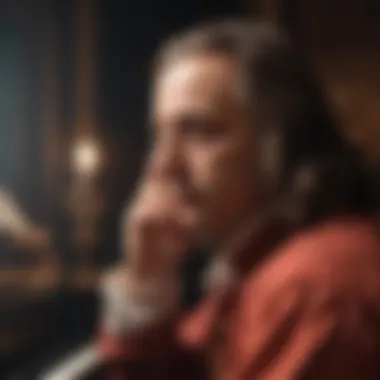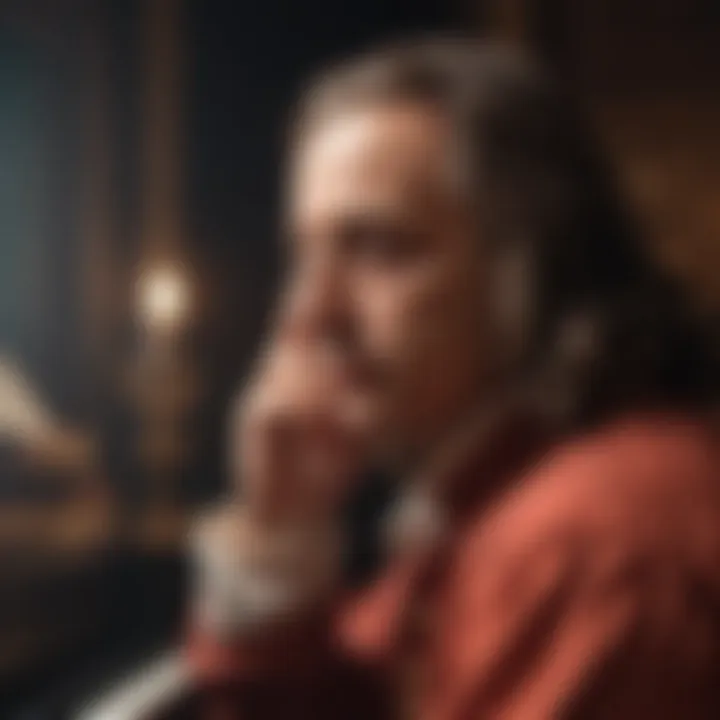The Philosophical Resonance of Pascal in Music


Intro
Blaise Pascal stands out as a towering figure in the spheres of mathematics, physics, and philosophy. However, his connection to music is often overlooked. This exploration aims to highlight the subtle yet profound ways in which Pascal's philosophical insights resonate within the realms of music theory and artistic expression. Music, as an art form, is driven by emotional and intellectual currents. Pascal's thoughts on human existence, faith, and reason offer essential context for understanding these currents.
In this article, we will delve into Pascal's legacy, examining how his ideas not only influenced key figures in music history but also continue to shape contemporary music discourse. By establishing a dialogue between his philosophical treats and musical composition, we hope to shed light on the enriching intersections of thought and creativity.
Artist Profile
Biography and Background
Blaise Pascal was born on June 19, 1623, in Clermont-Ferrand, France. He is well-known primarily for his contributions to mathematics and physics. Despite these achievements, Pascal had a profound interest in philosophy and theology. His writings, particularly "Pensées", reflect on the human condition, faith, and reason, offering insights that echo through various artistic expressions, including music.
Pascal's life was marked by tragedy and introspection, often leading him to deeper philosophical inquiries. His experience laid the groundwork for his thoughts on the emotional and rational experiences faced by individuals. Understanding Pascal's background enriches the context for analyzing his influence on music.
Major Influences and Inspirations
Pascal's thoughts are intertwined with the ideas of several great philosophers and scientists. The likes of Aristotle and Saint Augustine shaped his views on logic and faith. Moreover, the era in which he lived—the Baroque period—was a time when art, including music, deeply engaged with profound philosophical questions. His reflections on beauty, order, and chaos can be seen as part of a broader discourse that included the music of composers like Johann Sebastian Bach and Claudio Monteverdi.
In this section, we see how Pascal's philosophical inquiries resonate with major musical concepts:
- Emotional Expression: Pascal emphasizes the complexity of human emotions, a theme mirrored in many compositions.
- Transcendence: His thoughts on reaching beyond humanity are reflected in music that seeks to convey the divine.
- Rationality and Creativity: Pascal's balancing of logic and creative expression offers a framework for composers to navigate their own artistic identities.
"The heart has its reasons of which reason knows nothing." – Blaise Pascal
This quote encapsulates the tension between emotion and intellect, allowing us to understand the dual nature of music as both an art and a science.
The exploration of Pascal's philosophical impact establishes a foundation for deeper discussions about how his insights relate to specific musical compositions and themes. This connection to music invites a richer understanding of both disciplines.
Prelims to Blaise Pascal's Influence on Music
Blaise Pascal is often remembered for his groundbreaking work in mathematics and science, but his philosophical insights have had a more nuanced, yet significant, influence on music. The intersection between Pascal's thoughts and musical theory is a truly compelling area of exploration. By analyzing his perspective, we uncover layers of meaning in music that resonate with human experience, emotion, and intellect.
Understanding Pascal's influence provides valuable context for appreciating the depth of musical compositions and their philosophical underpinnings. Music, as an art form, transcends mere notes and rhythms; it embodies human experience and sentiment. Thus, examining Pascal's ideas can enhance our appreciation of how artists manipulate sound to convey profound concepts.
In this article, we will investigate key elements of Pascal's thoughts, particularly his philosophical framework, and how they connect to various concepts in music. This exploration allows us to see how Pascal's legacy continues to impact musicians and composers today, fostering a deeper understanding of their work.
Historical Context of Pascal's Life and Work
Blaise Pascal was born in 1623 in Clermont-Ferrand, France. His early life was marked by a rigorous education, driven by his father, who was a prominent figure in the field of mathematics. Pascal became notable at a young age, making significant advancements in geometry and probability theory. His contributions laid important foundations for modern mathematics.
In the mid-17th century, Pascal explored a range of topics, including theology and philosophy, which led him to develop the thoughts for which he is best known today. His seminal work "Pensees" presents a compelling argument for the integration of faith and reason. This duality presented by Pascal subtly influences various fields, including music, where the emotional and rational coexist.
Overview of His Contributions to Philosophy and Science
Pascal's work spans several disciplines, but it is his philosophical insights that provide a unique lens for examining musical concepts. His contemplation of the human condition reveals a deep understanding of existential struggle, an aspect often echoed in musical compositions. The interplay between faith and doubt in his writings reflects the emotional spectrum found in music.


One of Pascal's notable ideas is the concept of "the heart" as a means of understanding. He asserts that intuition plays an essential role in human experience, suggesting that understanding can often reside beyond rational thought. This notion is particularly pertinent to music, which often evokes feelings that words cannot capture.
Moreover, Pascal's principles of probability and uncertainty can be mirrored in the structures and choices made in musical composition. Many composers experiment with dissonance and resolution, effectively engaging with Pascal's thoughts on unpredictability in life. This connection emphasizes the relevance of his insights to music, encouraging a deeper appreciation of the complexities found in both fields.
Understanding Pascal's Philosophical Framework
Blaise Pascal's philosophical insights serve as a vital foundation for examining the intersections between his thought and music. His reflections on the human experience, coupled with his pursuit of knowledge and understanding, greatly enrich our comprehension of artistic expression. This framework encourages not only musicians and composers to consider deeper meanings in their work but also listeners to engage on a more cerebral level. By understanding Pascal's philosophical framework, one can appreciate the multidimensional aspects of music, including its ability to convey complex emotions and thoughts.
The Notion of the Human Condition
Pascal's exploration of the human condition reveals his deep interest in humanity's inherent struggles and capabilities. He viewed humans as beings caught between greatness and wretchedness, capable of both profound understanding and deep despair. This duality can greatly influence musical composition.
Musicians can draw from these themes to create works that embody the varied spectrum of human emotions. For instance, compositions that reflect joy often contrast with darker undertones, much like the human experience itself. This notion invites musicians to express the complexity of life through their art. In considering the human condition, artists may use dissonance, rhythm, and melody to mirror emotional highs and lows.
"Pascal's understanding of the human experience highlights the intrinsic value of emotional expression in music."
Faith and Reason in Musical Interpretation
Pascal famously argued for the balance between faith and reason, suggesting that both are essential for understanding truth. In the context of music, this balance can be especially significant. Interpretation of music often requires a harmonious blend of analytical skills and emotional insight.
Musicians must analyze the structure, harmony, and rhythm of a piece while also connecting with the underlying emotions it conveys. This duality mirrors Pascal's own philosophical approach to understanding the world. For example, a musician performing a complex score might reason out the technical structures while simultaneously expressing personal or collective sentiments tied to the piece. This framework encourages a deeper cognitive engagement with music, transforming the act of interpretation into a comprehensive experience that honors both intellect and emotion.
Establishing connections between Pascal’s philosophies and musical interpretation can lead to more profound performances and deeper appreciation from audiences, enriching the overall musical landscape.
The Relationship Between Mathematics and Music
Mathematics and music share a profound and critical relationship that extends beyond mere technical aspects. This connection is vital as it allows for a deeper understanding of musical composition and the aesthetic ideas that back them. Both fields operate on principles of patterns, structures, and forms that can be quantified and analyzed. Recognizing this interplay between mathematics and music enriches the discourse surrounding musical creation and appreciation.
By exploring the mathematical foundations of music, one can illuminate how composers utilize numerical relationships to create harmony, rhythm, and melody. This relationship further informs how musicians interpret and perform music. It is essential to understand this dynamic not only for the sake of academic curiosity but also for practical application in the arts.
Mathematical Foundations in Musical Composition
Mathematics serves as the backbone of many aspects of musical composition. For instance, the concept of rhythm relies heavily on time signatures and note durations, which can be expressed through mathematical ratios. Musicians often divide measures into smaller sections that reflect these ratios to create patterns that can be repeated or varied. This division is essential in forms like sonatas, symphonies, or even popular songs.
In Western music, the octave division can be described using logarithmic principles, further illustrating mathematical concepts at play. Frequencies and intervals are not just artistic choices; they are calculated relationships that govern how sounds interact. Many composers, like Johann Sebastian Bach, meticulously employed these musical ratios, illustrating that their work is not only an artistic pursuit but also a science.
Understanding these fundamental principles of mathematics can significantly enhance a musician's compositional skills, leading to more innovative and technically sound works.
Pascal’s Theories Applied to Musical Theory
Blaise Pascal's theories extend to musical theory in ways that highlight his profound impact on aesthetic frameworks. His philosophical discussions about order, chaos, and beauty resonate within the context of music. For example, Pascal emphasized a structured approach to understanding complex realities.
In music, this type of structured thinking can be seen in the development of scales and modes. The organization of pitches into different systems is a mathematical exercise that composers can manipulate to achieve various emotional effects. The tonal systems themselves can be examined through Pascal’s lens of probability and uncertainty, enabling insights into how music evokes a range of feelings.
Pascal's balance between faith and reason can also find expression in the dichotomous nature of simple versus complex compositions. Musicians frequently oscillate between straightforward melodic lines and intricate harmonic structures, much like Pascal’s navigation through faith and rational thought.
As such, applying Pascal's insights encourages musicians and theorists to think critically about how the principles of mathematics enhance our understanding of musical beauty and emotional depth.


Pascal's Notion of Aesthetics in Music
Blaise Pascal's philosophical framework provides a unique lens through which to examine music's aesthetic qualities. His thoughts on beauty, emotion, and the human experience resonate deeply within music theory and practice. Pascal considered aesthetics not merely as surface-level enjoyment but as core to the experience of understanding existence itself. This section investigates how Pascal’s ideas can enhance our appreciation of music's beauty and emotional resonance.
The Essence of Beauty in Musical Form
Pascal believed that beauty lies in the harmony of form and function. In music, this harmony unfolds through various elements such as melody, rhythm, and structure. Each element should not stand alone; rather, they must work together to create a cohesive and moving piece. This aligns with the classical understanding of music as not just sound but as a language with its own syntax and grammar.
Aesthetic beauty emerges from the balance and proportion within a composition. For instance, Johann Sebastian Bach's works exemplify this principle. His intricate use of counterpoint reflects Pascal's idea that beauty relates to the interlinking of separate entities to form a greater whole. Musicians studying Bach might engage with these ideas, discovering that appreciation for beauty in music can lead to deeper creation and performance.
- Key elements that highlight beauty in music include:
- Melodic structure: The way notes progress, whether ascending or descending.
- Harmonic textures: The blending of various chords and notes to evoke specific feelings.
- Rhythmic patterns: The arrangement and variation of beats that create pulse.
By embracing Pascal's notion that beauty is integral to the meaningful exploration of life, we can appreciate music not only for its auditory pleasure but for its deeper existential connections.
Emotions and Their Representation in Music
Pascal placed great emphasis on the interiority of human emotion. He believed that art—music included—serves as a powerful medium for conveying emotional truths. In this context, music acts as a bridge between the personal and the universal. Understanding how emotions translate into musical language is vital for both performance and composition.
For example, composers like Ludwig van Beethoven masterfully captured a spectrum of human emotions through their works. In "Moonlight Sonata," Beethoven evokes feelings of introspection and melancholy, aligning closely with Pascal’s view of music as a reflection of the human condition. This emotional communication resonates with listeners, often on a deeply personal level.
"Music is the shorthand of emotion."
– Leo Tolstoy
Exploring how emotions manifest in music can benefit aspiring musicians and enthusiasts. Some areas to consider include:
- Use of dynamics: Variations in volume add emotional weight.
- Tempo selection: Fast tempos can convey excitement, while slower tempos often signify sorrow.
- Instrumentation: Different instruments evoke specific emotions; for instance, strings might suggest warmth and intimacy, while brass can signify power or triumph.
By studying these aspects, musicians can create works that resonate with audiences on a deeper level. Pascal's contributions help frame our understanding of the emotional landscape that envelops the world of music, making it an essential consideration for anyone involved in the field.
By incorporating these themes into practice and appreciation, the legacy of Pascal continues to enrich our engagement with music.
Impact of Pascal's Ideas on Modern Musicians
Blaise Pascal's insights extend far beyond his contributions in mathematics and science. His philosophical reflections embed themselves in the very fabric of music, influencing contemporary artists and shaping the landscape of musical expression. The intersection of Pascal's thought with modern music provides a rich area for exploration, depicting how historical ideas can reverberate through time and inspire new generations.
Many modern musicians draw from Pascal's conception of the human condition. His views on despair and hope resonate particularly well with themes common in music, which often reflects on the complexities of life. Moreover, his dualistic approach to faith prompts artists to contemplate the balance between emotional depth and intellectual rigor in their work. Through this lens, music becomes not merely an art form but a medium through which existential questions can be posed and explored.
Contemporary Artists Influenced by Pascal's Philosophy
Contemporary musicians span a wide array of genres, each interpreting Pascal's philosophical underpinnings in unique ways. For example, artists like Leonard Cohen and Nick Cave weave narratives in their lyrics that express a longing for meaning—a theme central to Pascal's thoughts. Both artists grapple with human existence, combining melancholy with a quest for understanding, paralleling Pascal's own struggles with faith.
Other musicians, such as Arvo Pärt, incorporate notions of spirituality and simplicity in their compositions. Pärt’s music reflects Pascal’s idea of faith’s central role in the human experience, employing minimalist approaches that echo both the complexity and the beauty inherent in life.
Furthermore, Radiohead often addresses themes of uncertainty and isolation, drawing clear parallels to Pascal’s notions of despair. The band's willingness to question accepted norms mirrors Pascal's advocacy for intellectual inquiry, further cementing his philosophical legacy in modern music.


Analysis of Works Drawing from Pascalian Concepts
Numerous works today actively engage with Pascal's philosophy, reflecting the depth of his ideas and their relevance in contemporary society. For instance, the album "In the Aeroplane Over the Sea" by Neutral Milk Hotel showcases themes deeply rooted in existential contemplation. Tracks explore themes of love, loss, and the search for meaning—a clear reflection of Pascal’s exploration of the human condition.
Furthermore, John Adams' opera "Doctor Atomic" is replete with references to the ethical dilemmas faced during the development of nuclear weapons. The moral queries in this work resonate with Pascal's thoughts on human nature and the ethical responsibilities of knowledge.
"We are generally better pleased with things we do for ourselves than for others; we think we act left feedback solely for self-satisfaction."
This statement from Pascal encourages composers and musicians to consider their moral and philosophical influences. They often experiment with dissonance and structure as a means of communicating complexities—echoing Pascal's nuanced view of existence.
In summary, the impact of Pascal's ideas permeates the work of many modern musicians. Artists continue to explore and reinterpret his philosophical tenets, demonstrating the enduring significance of his thought. This connection not only illuminates how Pascal’s insights have shaped modern music but also invites deeper reflection among musicians and audiences alike, establishing a bridge across centuries that opens up new avenues for musical exploration.
Critical Reception of Pascal's Influence
The examination of Blaise Pascal's influence on music is a multifaceted endeavor, intertwining the realms of philosophy, aesthetics, and historical scholarship. The discourse surrounding Pascal's contribution to music theory and aesthetics raises critical questions. How do his ideas, rooted in the depths of philosophical inquiry, resonate through the melodies and harmonies of contemporary compositions? Analyzing works of art through this lens of Pascalian philosophy proves essential for both understanding artists' intent and enriching our own experiences as listeners.
Many scholars agree that Pascal's reflections on human existence are pivotal. His assertion about the duality of humanity, the convergence of the rational and the emotional, finds resonance in music's power to evoke feelings. The critical reception of Pascal’s legacy delves into these aspects, bridging the gap between his philosophical thoughts and the emotive nature of music. This integration of his ideas offers new perspectives for further scholarship, allowing the academic community to explore neglected areas where music and philosophy intersect.
"Pascal's insights into the human condition are not merely theoretical; they offer pathways for understanding emotional depth in artistic expressions, especially music."
Without doubt, current discussions around Pascal's influence illustrate how relevant his thoughts remain for understanding our modern landscape of music. Engaging with his philosophies can illuminate ongoing debates about the nature of artistic expression itself, leading to a richer appreciation of how artists navigate complex emotional terrains.
Scholarship on Music and Philosophy
The interplay between music and philosophy has garnered substantial attention within the academic community. Many scholars have studied the implications of Pascal's thoughts on the human condition in music. By examining texts, scores, and performances through a philosophical framework, researchers uncover layers of meaning that might otherwise remain hidden.
Some key scholarly works delve into the following areas:
- The Implicit Dialogue: Music is often seen as a dialogue between the composer and the listener. Pascal's reflection on the nature of communication aids in understanding this relationship.
- Emotional Resonance: Conductors and musicians frequently embody Pascal’s ideas, illuminating how performances convey layers of emotion.
- Philosophical Continuity: Interviews with contemporary artists reveal how Pascal's thoughts endure, influencing their creative workflows.
In their scholarship, authors engage with these themes to establish connections between Pascal's philosophy and modern musical practices. Such explorations not only enhance academic rigor but also provide valuable insights to students and aspiring musicians, informing their own creative journeys.
Debates Surrounding Musical Aesthetics
The debate surrounding musical aesthetics in light of Pascal's influence uncovers divergent viewpoints regarding how music is experienced and interpreted. Some theorists argue that music must adhere to certain rational principles exemplified in Pascal's mathematical explorations. Others posit that emotional expressiveness transcends rationality, echoing Pascal's thoughts on faith and emotion.
Prominent issues debated include:
- Rational vs. Emotional: Can music be adequately understood through a purely rational framework, or must we embrace emotional aspects as fundamental?
- Role of the Listener: How does Pascal's perspective on passive and active engagement shape our understanding of the listener's role in appreciating music?
- Aesthetic Value: In what ways do Pascal’s insights inform our judgments regarding the aesthetic value of different musical styles?
These discussions are vital for musicians and philosophers alike, presenting opportunities for deeper exploration. Addressing these debates enhances personal and collective understanding of music as an art form, beyond mere entertainment, elevating the discourse to a space imbued with philosophical significance.
End: Reassessing Pascal's Legacy in Music
Blaise Pascal’s influence in the realm of music extends beyond a mere intersection of his philosophical ideas and musical practices. His approach to understanding the human condition encapsulated his insights on faith, reason, and the emotional dimensions of existence. This article explored various aspects of his legacy, creating a foundation for a wider conversation around how his thoughts influenced musical theory and aesthetics.
The Enduring Relevance of Pascal's Thought
Pascal's ideas regarding the human experience continue to resonate within modern music. His assertion that faith and reason can coexist is particularly relevant today. Many contemporary composers infuse their works with this duality, creating pieces that reflect both emotional depth and intellectual rigor. For instance, the works of Arvo Pärt and John Adams often echo Pascal’s sentiments, embracing complexity while seeking simplicity through minimalism. This philosophical grounding enhances the listening experience, allowing musicians to connect with audiences on deeper levels. Thus, Pascal's legacy is not just historical; it pulsates through the veins of current musical expressions.
Future Directions for Research and Exploration
Research into Pascal's impact on music remains underexplored. Future endeavors could delve into specific case studies where Pascal’s theories have shaped artistic decisions. This includes looking at how concepts such as the ‘Pascalian wager’ may influence lyrical content and thematic development in modern genres like alternative and classical crossover. Moreover, interdisciplinary studies could bridge musicology, philosophy, and psychology, providing fresh frameworks for understanding musical engagement and its emotional significance. Such comprehensive investigations would enrich our appreciation of how Pascal's intellectual legacy navigates through contemporary music landscapes.







